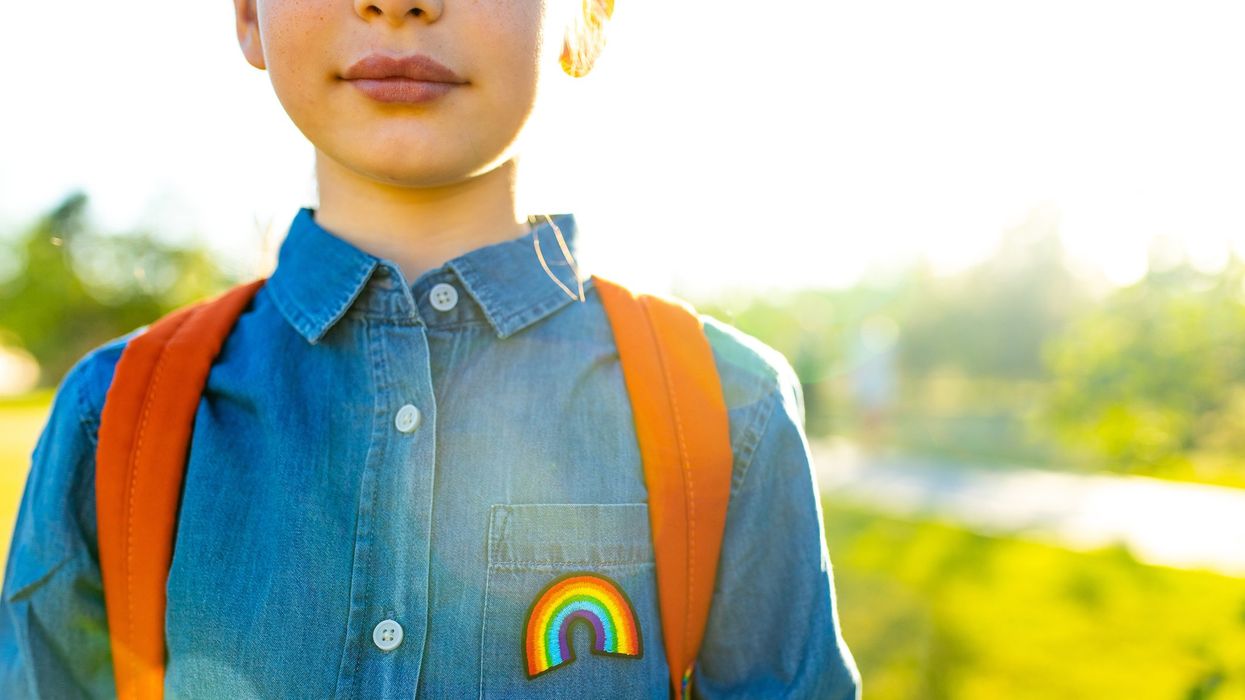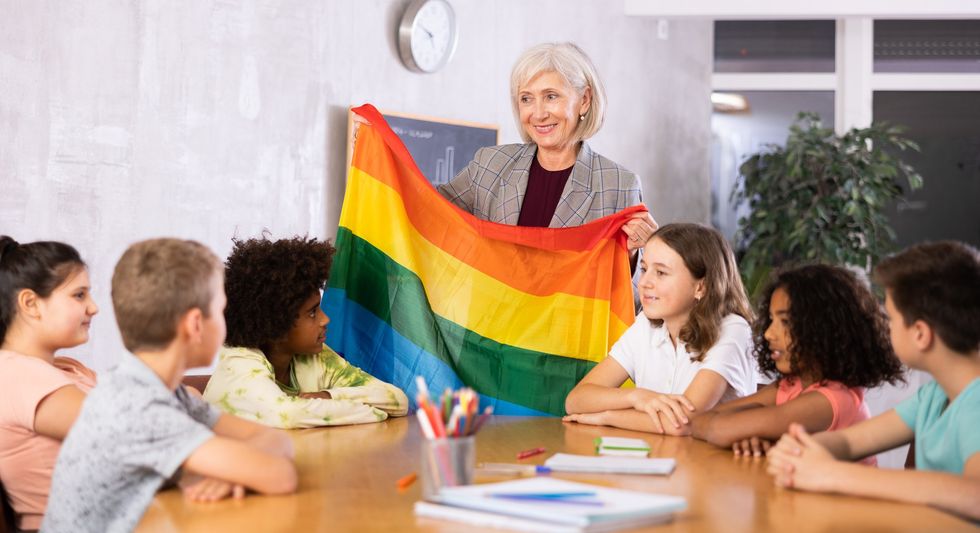
IURII KRASILNIKOV/Getty

New York Times columnist Pamela Paul last week published an op-ed titled, “As Kids, They Thought They Were Trans. They No Longer Do.”
The story is exactly what it sounds like. Cue the sound of a million “I told you so’s” from moderates and conservatives, as if not taking adolescents at their word is esoteric knowledge that required a sea of medical regret to validate.
We extended childhood indefinitely — because adolescence at least implies some measure of responsibility that is no longer there — and at the same time began insisting not only that children know better than their parents but that they are wiser than adults, period.
Teens don’t know any better, not in this world where a teen is effectively a kid. It’s a funny problem we created. We extended childhood indefinitely — because adolescence at least implies some measure of responsibility that is no longer there — and at the same time began insisting not only that children know better than their parents but that they are wiser than adults, period.
Now the line between listening to your child and ignoring your own hard-earned wisdom has been blurred. It’s hard to be a parent.
You’re constantly competing with Big Pharma and might not even know you are.

When I hear about detransitioners, I think about my early adolescence and another intricately connected problem: diagnosing kids with mental health conditions.
I grew up in the early days of taking kids, particularly teens, at their word in the post-Columbine haze of “the kids are not all right.” We were raised by a generation of Baby Boomers and Gen Xers who felt dismissed by their own Silent Generation parents. This time around, parents would take teens seriously.
Our parents were eager to seek institutional help. It wasn’t negligence, but it was ignorance. They did what they thought was right. It was a new style of parenting that over-emphasized trusting kids’ self-reports, an overcorrection to the prior norm of “teens don’t know anything.” Everyone around me had an eating disorder, a self-harm problem, or clinical depression, often developing after a journey of self-discovery on LiveJournal or Xanga or webMD or MySpace, ripe and ready to be medicalized.
At this time, gender trouble wasn’t a common menu item, but in a couple of years, it would be.
My parents, both relics of an old world if not the Old World in different ways, one a Texan and the other an immigrant, balked at this change of strategy. They remained in the “you’ll grow out of it” camp and eventually, the more progressive “if it’s still a problem at 21, we’re here to help.”
To them, my classmates on SSRIs by sixth grade weren’t “clinically depressed.” They were kids going through puberty. I remember my mom being in total disbelief at the cocktail of medications some of my peers were on. “How do they know?” she wondered, as in how do you know at 13 that you’ve got OCD?
“We know,” one mom who’d later become her arch-nemesis told her, “because unlike you, we trust our kids.”
My mom contended that she trusted us — and she did — but she also recognized that, at that age, you don’t know anything about yourself, much less the world. And you don’t know how much you don’t know, and that’s part of what makes it such a delicate time. Old enough to recognize the way things are but still too young to understand why. It wasn’t an insult. It was reality.
To me, though, it did feel like an insult.
All my peers got to see a therapist, and I was just as angst-ridden and disenfranchised and was told it was normal. It wasn’t that my parents weren’t helpful when I talked to them about how I was feeling, but therapy seemed … I don’t know … validating somehow. That all this pain wasn’t for nothing. It wasn’t my fault, and it wasn’t even the environment’s fault; there was some other, more explicable, more malleable force that was making me feel like this.
A force that I could control and subdue, maybe even with a pill, if I wanted to.
I tested my parents’ boundaries by learning about different “psychiatric identities” online and turning the volume up on symptoms I thought I already displayed. It was an attempt to galvanize them to take me to a doctor.
It wasn’t quite as manipulative as that sounds.
Don’t get me wrong, it was still attention-seeking behavior, but I was also looking for answers in my own clumsy teenage way. Garden-variety social anxiety turned into a disavowal of eye contact. Sadness cranked up to full-blown depression. I was leaning into antisocial tendencies. Self-discovery as told by the Diagnostic and Statistical Manual of Mental Disorders.
Some of these self-diagnoses had better explanatory power than others. Like astrology, they felt like they explained everything about the world around me. But my parents held the line: No. Wait and if you’re still feeling this way when you’re older, we’ll see.
My mom negotiated a now-strange position: infinite patience when listening to my problems and an absolute refusal to pathologize them. I knew she’d listen to me, so I didn’t go looking for a mother elsewhere. But she also didn’t give me what I wanted, which was an identity I could cleanly slot myself into.
As frustrating for me as my mother’s strategy was, it did wear me out. As puberty ended, being sick stopped being attractive, and I slowly began to see it for what it was. Something that’s real, something that happens, but not something you should want for yourself or your loved ones. Not a life sentence or a sign that you’re a “bad person” or anything of the sort, either, but still, exhaust your other options first.
And that encouraged me to find other ways to navigate my emotional turmoil. It took years — and I do mean years — but eventually, I got it.
I found myself getting curious about why my friends didn’t try strategies other than, say, sertraline. I don’t mean to say that none of them were depressed or that they didn’t need genuine psychiatric intervention. That isn’t my call to make, and I’m not one of these people who’s wholesale opposed to therapy or even meds.
I wonder if another overcorrection is in the mail, one that casts doubt on mental health, period, creating a whole new mental health crisis.
But as I matured out of wanting to substantiate my own sense of self with a diagnosis, I started to notice the paucity of trying other things under the guise of that being a dangerous form of “invalidating one’s lived experience.”
“I’m mentally ill” was a crutch. An easy, one-size-fits-all explanation for everything as well as an excuse. My mom was right: How did they really know? And more importantly, how can you really grow up in a world that treats mental health diagnoses like this?
I wonder if another overcorrection is in the mail, one that casts doubt on mental health, period, creating a whole new mental health crisis.
A world where instead of everyone being depressed, nobody is depressed, and nobody is schizophrenic, bipolar, or has OCD either.
- YouTube youtu.be
Katherine Dee
Contributing Editor, Return